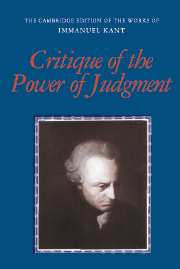Book contents
- Frontmatter
- Contents
- General editors' preface
- Editor's introduction
- First Introduction to the Critique of the Power of Judgment
- Critique of the Power of Judgment
- Preface
- Introduction
- First Part: Critique of the Aesthetic Power of Judgment
- First Section, First Book: Analytic of the Beautiful
- First Section, Second Book: Analytic of the Sublime
- Deduction of Pure Aesthetic Judgments
- Second Section: The Dialectic of the Aesthetic Power of Judgment
- Appendix: On the Methodology of Taste
- Second Part: Critique of the Teleological Power of Judgment
- Appendix: Methodology of the Teleological Power of Judgment
- Method of citation and abbreviations
- Editorial notes
- Glossary
- Index
First Section, First Book: Analytic of the Beautiful
Published online by Cambridge University Press: 05 April 2013
- Frontmatter
- Contents
- General editors' preface
- Editor's introduction
- First Introduction to the Critique of the Power of Judgment
- Critique of the Power of Judgment
- Preface
- Introduction
- First Part: Critique of the Aesthetic Power of Judgment
- First Section, First Book: Analytic of the Beautiful
- First Section, Second Book: Analytic of the Sublime
- Deduction of Pure Aesthetic Judgments
- Second Section: The Dialectic of the Aesthetic Power of Judgment
- Appendix: On the Methodology of Taste
- Second Part: Critique of the Teleological Power of Judgment
- Appendix: Methodology of the Teleological Power of Judgment
- Method of citation and abbreviations
- Editorial notes
- Glossary
- Index
Summary
First Moment of the judgment of taste, concerning its quality.
The judgment of taste is aesthetic.
In order to decide whether or not something is beautiful, we do not relate the representation by means of understanding to the object for cognition, but rather relate it by means of the imagination (perhaps combined with the understanding) to the subject and its feeling of pleasure or displeasure. The judgment of taste is therefore not a cognitive judgment, hence not a logical one, but is rather aesthetic, by which is understood one whose determining ground cannot be other than subjective. Any relation of representations, however, even that of sensations, can be objective (in which case it signifies what is real in an empirical representation); but not the relation to the feeling of pleasure and displeasure, by means of which nothing at all in the object is designated, but in which the subject feels itself as it is affected by the representation.
To grasp a regular, purposive structure with one's faculty of cognition (whether the manner of representation be distinct or confused) is something entirely different from being conscious of this representation with the sensation of satisfaction. Here the representation is related entirely to the subject, indeed to its feeling of life, under the name of the feeling of pleasure or displeasure, which grounds an entirely special faculty for discriminating and judging a that contrib-utes nothing to cognition but only holds the given representation in the subject up to the entire faculty of representation, of which the mind becomes conscious in the feeling of its state.
- Type
- Chapter
- Information
- Critique of the Power of Judgment , pp. 89 - 127Publisher: Cambridge University PressPrint publication year: 2000
- 4
- Cited by

